Various romantic figures have passed through Sintra. From literature to music, Sintra has inspired and fascinated many with its mystical and involving atmosphere. Famous personalities in Portuguese and international Romantic culture have not just left their mark in Sintra but, above all, have left the mark of Sintra in their cultural legacies.
Sintra in Portuguese Romanticism
This originated with the publication of the poem Camões, by Almeida Garret, in 1825.
This originated with the publication of the poem Camões, by Almeida Garret, in 1825.
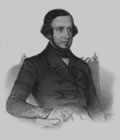 Almeida Garret, who, together with Alexandre Herculano, introduced Romanticism to Portugal, evokes Sintra as follows: "shady Sintra", "beautiful Sintra", the "healthiest retreat", the "pleasant resort, / throne of verdant spring, / Who does not love thee? Who, if in thy bosom / An hour of life has passed, / Will forget that hour?".
Almeida Garret, who, together with Alexandre Herculano, introduced Romanticism to Portugal, evokes Sintra as follows: "shady Sintra", "beautiful Sintra", the "healthiest retreat", the "pleasant resort, / throne of verdant spring, / Who does not love thee? Who, if in thy bosom / An hour of life has passed, / Will forget that hour?". 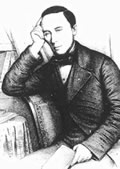 Many other Portuguese writers have put their impressions of Sintra on paper: Bulhão Pato, Camilo Castelo Branco, Eça de Queirós, António Nobre, Fernando Pessoa, Raul Brandão, Manuel Teixeira-Gomes, Jaime Cortesão, Aquilino Ribeiro and Vergílio Ferreira. Fernando Pessoa further enhanced Sintra's mystical aura when he met there with Aleister Crowley, the mystical English sorcerer, who saw Sintra as the ideal spot for his occult practices.
Many other Portuguese writers have put their impressions of Sintra on paper: Bulhão Pato, Camilo Castelo Branco, Eça de Queirós, António Nobre, Fernando Pessoa, Raul Brandão, Manuel Teixeira-Gomes, Jaime Cortesão, Aquilino Ribeiro and Vergílio Ferreira. Fernando Pessoa further enhanced Sintra's mystical aura when he met there with Aleister Crowley, the mystical English sorcerer, who saw Sintra as the ideal spot for his occult practices.Or Ferreira de Castro, who is buried in the Serra (mountains). Indeed, can there be a more romantic expression than the wish to be buried in the middle of Nature on the road to the Moorish Castle, on the wayside for anyone passing by?
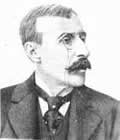 Eça de Queiróz (1845-1900) is one of the major figures who described the Romantic atmosphere of Sintra. Nearly all his works mention and embrace it:
Eça de Queiróz (1845-1900) is one of the major figures who described the Romantic atmosphere of Sintra. Nearly all his works mention and embrace it:"I had always loved Sintra! As soon as one entered, the dark, murmurous trees of the Ramalhão gave it a happy melancholy! (...) the walks around Seteais in the moonlight, strolling on the pallid grass, with long, silent rests in Penedo da Saudade, gazing at the valley, the sands in the distance, full of a healthy, idealising white light; the hot siestas in the shade of Penha Verde, listening to the cool water trickling from stone to stone; the afternoons in Várzea de Colares, rowing an old boat on the dark water in the shade of the ash-trees."
O Primo Basilio (Cousin Basílio)
"But the road entered between two high parallel walls, where murmurous branches wept. It was Ramalhão.
The air seemed finer, as if refreshed by the abundance of water. One felt a vague serenity of parks and woods. Something soft and elegant circulated. There was the silence of tender repose and leisurely existence. It was the Ramalhão."
A Tragédia da Rua das Flores (The Tragedy of Rua das Flores)
The air seemed finer, as if refreshed by the abundance of water. One felt a vague serenity of parks and woods. Something soft and elegant circulated. There was the silence of tender repose and leisurely existence. It was the Ramalhão."
A Tragédia da Rua das Flores (The Tragedy of Rua das Flores)
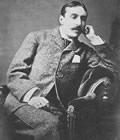 "In the bay of the arch, as inside a heavy stone frame, shone the rich afternoon light, a marvellous picture of almost fantastic composition, like the illustration of a beautiful legend of chivalry and love. In the foreground was the courtyard, deserted and growing green, all speckled with yellow buds; in the background the serried row of ancient trees, with ivy on their trunks, forming a wall of glittering foliage along the frame. Emerging abruptly from this leafy line of sunny copse, one climbed into the full splendour of the day, in which, standing out vigorously in clear relief against the bright blue sky, was the airy summit of the mountains, all dark violet and crowned by the Pena Palace, romantic and solitary on high, with its dark park at its feet, the slender tower lost in the air and the domes shining in the sun as if made of gold...".
"In the bay of the arch, as inside a heavy stone frame, shone the rich afternoon light, a marvellous picture of almost fantastic composition, like the illustration of a beautiful legend of chivalry and love. In the foreground was the courtyard, deserted and growing green, all speckled with yellow buds; in the background the serried row of ancient trees, with ivy on their trunks, forming a wall of glittering foliage along the frame. Emerging abruptly from this leafy line of sunny copse, one climbed into the full splendour of the day, in which, standing out vigorously in clear relief against the bright blue sky, was the airy summit of the mountains, all dark violet and crowned by the Pena Palace, romantic and solitary on high, with its dark park at its feet, the slender tower lost in the air and the domes shining in the sun as if made of gold...".Os Maias (The Maias) "And all summer he spent in the capital; then in Sintra, where the dark languor of his moist eyes would melt hearts."
A Ilustre casa de Ramires (The Illustrious House of Ramires)
"Later, one morning, I would glimpse the cool mountains of Sintra cutting across the blue wave; the seagulls from the beach would come and give me their cry of welcome."
A Relíquia (The Relic)
A Relíquia (The Relic)
"The next day, in a moment of affection and wishing to give his happiness a more poetic form, Godofredo suggested spending a few days in Sintra. It was a honeymoon. They were at Lawrence's, where they had a small drawing-room all to themselves. They would get up late, drink champagne and kiss discreetly, on the benches under the trees."
Alves & Cª
Alves & Cª
Sintra in International Romanticism
The young Northern European aesthetes, whether by their own wish or obliged by the circumstances of a chequered life, had the Grand Tour through the classical roots of the West " Italy and Greece " to tear apart closed horizons. In the countries of the Iberian Peninsula they found the vestiges of an exoticism of medieval origins, with a Moorish touch. Sintra became part of this itinerary, arousing the admiration of numerous men of letters, of whom the following were especially important:
William Beckford, an extremely wealthy and cultivated aristocrat, author of the Gothic novel Vathek, landed in Lisbon in 1787. When he visited Sintra he described it as a "vast temple of nature". The following decade he became the tenant of the Palace of Montserrate and its estate.
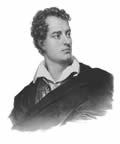 Lord Byron was a key figure in Romanticism and in Sintra. He came to Sintra in 1809, staying at Lawrence's. He referred to Sintra in his correspondence: ("Thus far have we pursued our route and seen all sorts of marvellous sights, &c. " which, being to be heard in my friend Hobhouse's forthcoming Book of Travels, I shall not anticipate by smuggling any account whatsoever to you in a private and clandestine manner. I must just observe, that the village of Cintra, in Estremadura, is the most beautiful perhaps in the world.", excerpt from the letter to Mr. Hodgson, on 16 July 1809). Sintra is immortalised in Byron's work in the poem "Childe Harold's Pilgrimage", as an Eden, a paradise
Lord Byron was a key figure in Romanticism and in Sintra. He came to Sintra in 1809, staying at Lawrence's. He referred to Sintra in his correspondence: ("Thus far have we pursued our route and seen all sorts of marvellous sights, &c. " which, being to be heard in my friend Hobhouse's forthcoming Book of Travels, I shall not anticipate by smuggling any account whatsoever to you in a private and clandestine manner. I must just observe, that the village of Cintra, in Estremadura, is the most beautiful perhaps in the world.", excerpt from the letter to Mr. Hodgson, on 16 July 1809). Sintra is immortalised in Byron's work in the poem "Childe Harold's Pilgrimage", as an Eden, a paradise "Lo! Cintra's glorious Eden intervenes
In variegated maze of mount and glen.
Ah me! what hand can pencil guide, or pen,
To follow half on which the eye dilates
Through views more dazzling unto mortal ken
Than those whereof such things the bard relates,
Who to the awe-struck world unlocked Elysium's gates?"
In variegated maze of mount and glen.
Ah me! what hand can pencil guide, or pen,
To follow half on which the eye dilates
Through views more dazzling unto mortal ken
Than those whereof such things the bard relates,
Who to the awe-struck world unlocked Elysium's gates?"
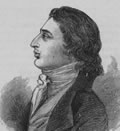 Robert Southey, one of the Lake Poets (an important early Romantic movement) spent some years in Portugal. At first he disliked it, but later fell in love with Sintra: "I never beheld a view that so effectively checked the wish of wandering. Had I been born at Cintra, methinks no inducement could have tempted me to leave its delightful springs and shades, and cross the dreary wilderness that insulates them. " (Letters Written During a Journey in Spain and a Short Residence in Portugal, 1808). He even considered Sintra to be "the most blessed spot on the whole inhabitable globe".
Robert Southey, one of the Lake Poets (an important early Romantic movement) spent some years in Portugal. At first he disliked it, but later fell in love with Sintra: "I never beheld a view that so effectively checked the wish of wandering. Had I been born at Cintra, methinks no inducement could have tempted me to leave its delightful springs and shades, and cross the dreary wilderness that insulates them. " (Letters Written During a Journey in Spain and a Short Residence in Portugal, 1808). He even considered Sintra to be "the most blessed spot on the whole inhabitable globe".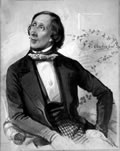 Hans Christian Andersen was in Sintra as a guest of the O'Neill family from 26 July to 8 August 1866. He said that "all foreigners will be able to find a piece of their homeland in Sintra. I discovered Denmark there. But I thought I rediscovered many beloved pieces of other beautiful lands....". But "the Palácio is entirely lacking in beauty, with its twin chimneys looking more like champagne bottles." Yet "different, more beautiful and picturesque" is "D. Fernando's summer palace". "The whole mountain road is a garden, a wonderful combination of nature and art, the most beautiful walk you can imagine." Monserrate is "a true vignette of the Thousand and One Nights, a fairy-tale vision". In short, "unrivalled Sintra, the most beautiful and lauded part of Portugal".
Hans Christian Andersen was in Sintra as a guest of the O'Neill family from 26 July to 8 August 1866. He said that "all foreigners will be able to find a piece of their homeland in Sintra. I discovered Denmark there. But I thought I rediscovered many beloved pieces of other beautiful lands....". But "the Palácio is entirely lacking in beauty, with its twin chimneys looking more like champagne bottles." Yet "different, more beautiful and picturesque" is "D. Fernando's summer palace". "The whole mountain road is a garden, a wonderful combination of nature and art, the most beautiful walk you can imagine." Monserrate is "a true vignette of the Thousand and One Nights, a fairy-tale vision". In short, "unrivalled Sintra, the most beautiful and lauded part of Portugal".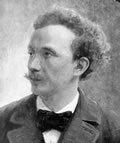 It is not only in literature that the romanticism of Sintra has left its mark. Richard Strauss, the composer, describes Sintra: "Today is the happiest day of my life. I know Italy, Sicily, Greece and Egypt, and I have never seen anything, anything, to match the Pena. It is the most beautiful thing I have ever seen. This is the true Garden of Klingsor and there, up above, is the Castle of the Holy Grail". He describes Pena Palace as beating "all the records for extravagance. Built on a rock on the highest point of the Serra (mountains), the building, which seems to come straight out of a fairy-tale, looms out of the greenery with its vivid colours of scarlet and canary yellow". The magic of Sintra also influenced Viana da Motta, the musician, and Cristino da Silva, the painter. Domenico Schioppetta took his portrait of Sintra to Italy and William Burnett painted Sintra for England to see.
It is not only in literature that the romanticism of Sintra has left its mark. Richard Strauss, the composer, describes Sintra: "Today is the happiest day of my life. I know Italy, Sicily, Greece and Egypt, and I have never seen anything, anything, to match the Pena. It is the most beautiful thing I have ever seen. This is the true Garden of Klingsor and there, up above, is the Castle of the Holy Grail". He describes Pena Palace as beating "all the records for extravagance. Built on a rock on the highest point of the Serra (mountains), the building, which seems to come straight out of a fairy-tale, looms out of the greenery with its vivid colours of scarlet and canary yellow". The magic of Sintra also influenced Viana da Motta, the musician, and Cristino da Silva, the painter. Domenico Schioppetta took his portrait of Sintra to Italy and William Burnett painted Sintra for England to see.





